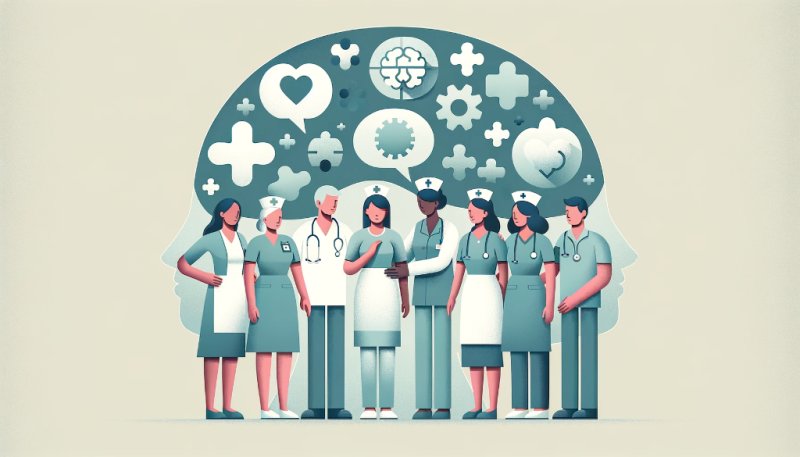How Can Nurses Reduce Stigma About Mental Illness

In the ever-evolving landscape of healthcare, one constant challenge remains: the stigma associated with mental illness. Nurses, standing on the frontlines of patient care, encounter mental health issues regularly, not just in psychiatric settings but across all areas of healthcare. This stigma not only affects patients but also the nurses themselves, who may grapple with their mental health concerns. In a profession where caring for others is paramount, it's crucial to address how nurses can actively participate in reducing the stigma surrounding mental health.
The Reality of Mental Health Stigma in Nursing
The COVID-19 pandemic has cast a stark light on the mental health struggles faced by healthcare professionals, particularly nurses. High patient acuity, staffing shortages, and increased care needs have contributed significantly to heightened levels of depression, anxiety, and overall burnout among nurses. This mental and emotional toll is not just a personal challenge but also a professional obstacle. Nurses who experience stigma associated with mental health issues may be hesitant to seek care, fearing social and professional consequences. The American Nurses Association acknowledges this stigma and emphasizes the need to dismantle it as a barrier to mental health care.
The onset of the pandemic has intensified emotional outcomes, unleashing new or recurring mental health disorders. The resulting wave of depression, anxiety, and other mental health issues is not only challenging to witness but also difficult to manage. Nurses find themselves in a unique position to help reduce the stigma associated with these disorders. Yet, this is a daunting task, considering the emotional and physical demands already placed on them. The need for a concerted effort to alleviate the shame or denial about mental health assistance is more critical than ever, as it could ease symptoms and potentially save lives.
Licensure and Stigma: A Barrier to Mental Health Care

The process of nursing licensure itself can inadvertently perpetuate the stigma surrounding mental health. A national review led by The Ohio State University revealed that a significant number of U.S. nursing licensure applications include intrusive questions about mental health and substance use. Such questions not only deepen the stigma but also discourage nurses from seeking the help they may need. The fear of job loss or professional consequences often leads nurses to forgo mental health care. This situation underscores a systemic issue where the very process meant to ensure competent care inadvertently reinforces harmful stigmas.
Further compounding the issue, the National Council of State Boards of Nursing has not yet released guidance comparable to that of the Federation of State Medical Boards, which recommended the removal of invasive mental health questions from physician licensure applications. The absence of such guidance in nursing highlights a critical gap in the efforts to destigmatize mental health care among nursing professionals.
Understanding and Combating Stigma in Everyday Practice
Combatting mental health stigma in nursing requires a multifaceted approach, starting with understanding how stigmas act as barriers to treatment. Mental health issues, if left untreated, can worsen, affecting relationships, careers, and overall quality of life. This is particularly pertinent in areas like elder care services, where understanding and addressing mental health needs are crucial for both the caregivers and the elderly receiving care. Nurses who internalize stigma may become pessimistic and lose hope for recovery. Additionally, stereotypes portraying individuals with mental illness as dangerous contribute to their social isolation.
To effectively reduce stigma, nurses need to work on self-awareness of personal biases. Comparing attitudes towards patients with physical illnesses like diabetes or cancer versus those with mental health conditions like depression or schizophrenia can be eye-opening. Recognizing any bias is the first step towards change. Furthermore, discussing mental health openly and confidently helps demystify these conditions. Using person-first language is also crucial; a person is not defined by their condition and should not be addressed as such. Casual references to mental health conditions should be avoided, as they can undermine legitimate diagnoses and contribute to the stigma. Finally, normalizing COVID-19-related stress and providing appropriate support and information can be significantly beneficial.
Role of Nurse Leadership in Addressing Mental Health Stigma
Leadership in nursing plays a pivotal role in addressing mental health stigma. Nurse leaders and managers are in a unique position to cultivate a work environment that prioritizes mental health and challenges existing stigmas. This requires a commitment to open dialogue about mental health, ensuring that nurses feel safe and supported when discussing their mental health concerns or seeking assistance.
Nursing organizations and leaders can initiate programs and policies that foster a stigma-free workplace. These could include training sessions focused on mental health awareness, providing resources for mental health support, and encouraging a culture where seeking help is viewed as a strength rather than a weakness. Leaders must also advocate for changes in licensure and credentialing processes that do not penalize nurses for past mental health issues or treatment. By setting a precedent of understanding and acceptance, nurse leaders can significantly impact how mental health is perceived and addressed within the nursing profession.
Conclusion
In this article, we have discussed how nurses can reduce stigma about mental illness. The stigma surrounding mental illness in nursing is a multifaceted issue that requires attention from individual nurses, nurse leaders, and the healthcare system at large. By understanding and addressing personal biases, discussing mental health openly, and using respectful language, nurses can begin to dismantle the barriers created by stigma. Leadership has a crucial role in advocating for systemic changes and fostering a supportive environment. The path towards a stigma-free profession is challenging, but with concerted efforts, it is achievable. As nurses continue to provide care for others, it's equally important to care for their mental well-being, creating a healthier and more empathetic healthcare environment for all.
More to Read:
Previous Posts:
Next Posts:




